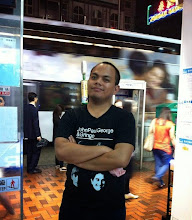A
few days ago, I was seating on my favorite chair at home, shirtless and eating
donut while watching TV when my 5 year-old son Charles approached me, rubbed my
tummy and said, “Daddy, be good to your
tummy, ha?”
Yesterday,
I felt a little dizzy waking up for work after I slept a little over midnight
to finish a movie I downloaded online. I’ve been staying up late for movie
marathons since college and this was probably the first time, as far as I can
remember, that I felt like that.
And
just this afternoon, PhilCare sent me a Wellness Box that includes (let me test my memory if I can still
remember all the items without opening the package again) a jumping rope, a
bar of calamansi soap, a bar of
oatmeal soap, a pack of health tea, a bottle of seaweed mask, a bottle of
organic essential oil and a health card. Hmm, I hope I did not miss any item.
With
the series of signs pointing me to be a little cautious with my health, I am
now thinking of ways on how to be fit again. I hate to admit it but I think I
am not as healthy as I think I am. Have you asked yourself the same question lately?
By
the way, the “box” that I got was from top HMO provider in the Philippines, PhilCare, which I want
to commend for doing an awesome job with my health insurance for three years
now. Just recently, I heard that
PhilCare, aside from providing medical and hospitalization benefits to
its member, went an extra mile in coming up with a study to determine the state
of health of the Filipinos in a more holistic manner. Benchmarked with similar
studies conducted in developed countries, the PhilCare Wellness Index, which is
the first wellness index in the Philippines, serves as an eye-opener on how
Filipinos perceive leading healthy lives.

Designed,
managed and analized by Dr. Fernando Paragas, a Filipino professor at the
Nanyang University in Singapore commissioned by Philcare, the study involved a
face-to-face interview with 1,200 respondents from Metro Manila and key cities
in the country where they were asked about matters pertaining to their
lifestyles as well as the nutritional, physical, psychological, and medical
aspects of their lives.
The
PhilCare Wellness Index, considered as a ground-breaking study to measure and
uncover Pinoy’s sense of well being, shows some interesting results that I
would like to share. In general, many Filipinos feel good about their health.
The bad news is that they may not really be as healthy as they would like to
think. We have a tendency to be in denial about our health which reflects our habit
of starting to be mindful about our well-being only when we start to get sick.
1. Most Filipinos think they are fit yet
they’re not. The survey said that 54 percent of the respondents believe
their weight is ideal for their height and that 54 percent think they are in
overall good health. After analyzing their actual height and weight, it appears
that only 45 percent of them fit the normal category applying the Asian Body
Mass Index range. About 46 percent are either overweight or obese, while
another 8.6 percent fall below the average BMI.
2. We know what a healthy diet is but are not
eating the right food. The PhilCare Wellness Index showed that 44 percent
of respondents believe that they know what comprises a balance diet. In fact,
70 percent said they eat breakfast regularly, while about 60 percent eat fruits
and vegetables daily. However, about 27 percent of them regularly eat fried or
fatty food, 21 percent love eating sugary foods and drinks, and 15 percent eat
processed and junk food daily.
3. Sex matters. Lovemaking carries a big
impact in a person’s morale and over all psychological well-being. The study
tells that that married couples should work more to build the intimacy in the
marriage because a healthy intimate moment equates to psychological health.
4. People with status “It’s Complicated” are more active in bed. Widowed and
separated Filipinos are having more sex than the usual married individuals. It
said that a married person do it 2.95 times per week, while a widowed person’s
average is 4.33 a week. A separated person is slightly higher at 4.38.
5. There is a lack of prevention
against diseases. The PhilCare Wellness Index also reports majority of Filipinos regularly
drink alcohol. About 58 percent said they drink alcoholic beverages. They
consume about six bottles or glasses of alcohol per week. About 49 percent also
smoke cigarettes and, on average, they consume 10 sticks daily.
6. Work-life balance is a must but many
misinterpret it. 85% of
Filipinos enjoy a good work-life balance. However, 41.1percent of them admit
experiencing stress slightly. The reason for this is that many still tend to
relate the “happy hour” mentality as a means to achieve a balanced life.
Regarding stress, many resort to binge drinking after office. This is their way
to handle stress.
7. Filipinos tend to behave when it
comes to getting medical care. On the upside, 59 percent of respondent said they
can easily go to a doctor whenever they get sick. Despite this, majority – or
74 percent – still admit that they self-medicate, which is a very dangerous
habit of Filipinos.
So you
see dear friends and countrymen, admit it or not, we
are not as healthy as we think we are. When do we need to start to change our
ways for a healthier life? The answer is now. Again, I’m echoing what my son
said to me recently, “Be good to your tummy.” That’s one good first step we can
all take in our journey towards wellness.
















